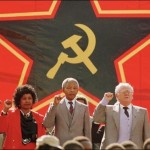
The death of Nelson Mandela on December 5 marked the loss of an outstanding leader in the struggle for human liberation. But for millions of people around the world, it was also an occasion to celebrate Mandela’s remarkable contributions.
Many political activists who came into the Communist Party of Canada and other progressive movements during the past half century or more were dedicated supporters of the anti-apartheid struggle led by the African National Congress, Umkhonto we Sizwe, the South African Communist Party, COSATU, and other organizations.
As working class internationalists, Communists also were deeply involved in campaigns to build solidarity with the peoples of Vietnam, Cuba, Nicaragua, Chile, Palestine, and many other countries. Among these struggles, the fight against the racist regimes of Southern Africa had a special place.
From the 1940s through the ’80s, the pages of the Canadian Tribune, Pacific Tribune, Combat, Rebel Youth, and other revolutionary publications carried literally hundreds of articles about the freedom movements in South Africa, Angola, Mozambique, Namibia, and Zimbabwe. Members of our party worked side by side with increasing numbers of other activists, devoting thousands of hours to consumer boycotts of South African products, opposition to sports or cultural events connected with the apartheid regime, and efforts to engage trade unions, churches, students and other movements in solidarity campaigns.
Canadian communists were deeply inspired by the courageous struggles of the ANC and SACP, by the fighters of Umkhonto we Sizwe, and by the heroic prisoners of Robben Island. Whenever we went to leaflet yet another liquor store selling Paarl brandy, or to raise the issue of apartheid at another labour convention, we took courage from the examples of Nelson Mandela and all those who risked death or imprisonment to challenge the racist regime in Pretoria.
In recent days, many platitudes have been printed about the role of certain politicians in ending apartheid. But those “leaders” were nowhere in sight when anti-apartheid activists worked tirelessly to defeat the racist regime. Rarely did Canadian politicians answer letters and petitions calling for a complete political, economic and diplomatic boycott of Pretoria. In fact, many condemned the ANC for mobilizing massive popular resistance and armed struggle against the white supremacist system, instead advocating so-called “constructive engagement” tactics. The same politicians spewed anti-communist attacks against the ANC and Umkhonto for welcoming the concrete solidarity of Cuba, the USSR, the German Democratic Republic and other socialist countries, which helped to defeat South African military forces on the battlefield, forcing the regime to negotiate with Nelson Mandela and the ANC.
This historic trajectory of struggle began with the efforts of Communists and their allies, both inside South Africa and internationally, based on the strategy of building the ANC/SACP/COSATU alliance and the huge mass peoples’ movement which became the irresistible force that pushed apartheid off the stage.
Some Canadian politicians such as Brian Mulroney were finally compelled to oppose continued white minority rule. But even then, they acted as imperialist representatives of big business such as mining transnationals, which hoped to ensure that the transition from apartheid did not interrupt the flow of profits or lead towards socialism in the new South Africa.
The Communist Party of Canada takes deep pride in our contributions to the anti-apartheid struggle, from its very beginning to the historic moment of Nelson Mandela’s release from the prisons of apartheid, and during the last two decades of democratic, non-racial government. We express our confidence that the working class will carry forward the legacy of comrade Mandela, leading to full emancipation and freedom in a future socialist South Africa.
Amandla ngawethu! Power to the people!
Central Executive Committee, Communist Party of Canada, January 10, 2014